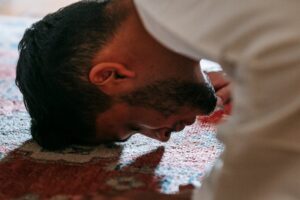Last time we came to the conclusion that Quran did not argue whether the Meccans had or did not have a religion. Also, Prophet Mohammad did not say to them: You do not have a religion and I am bringing you one. His message was mainly about a new approach to the concept of religion and the quality of religion.
Prophet Mohammad would ask through Quran two main questions:
The first question came in Surah Al-Maoun, the first revealed chapter in Mecca to speak about religion. “Have you seen the one who denies the religion?” [107:1]
Quran has its own outlook about religion as a social phenomenon. Quran brings before us a new and unique definition of religion as it answers the above question. Quran does not say: He is the one who disbelieves in Allah and his prophets, but puts before us a new definition by adding a new dimension- the dimension of human responsibility. Quran is saying: Those who absolve themselves from their social responsibilities are practically denying and betraying their religion.
“Then such is the one who repulses the orphan and encourages not the feeding of the indigent.” [107:2-3]
From the beginning Quran was formulating a new concept about religion by focusing on its strong connection to human actions. Religion is relevant and meaningful in human life when it is translated into mercy and kindness, especially to those who are unfortunate like the orphan and the indigent. Mecca was suffering from social and economic imbalance, the exploitation of the weak by the powerful, and the disenfranchisement of the poor. Mecca was in dire need of a new paradigm, a new pattern of thinking that takes its understanding about religion to the highest level possible. In order to make its point stronger about the understanding of religion in practice, Quran brings before us a practical demonstration from real life. “Woe to the worshippers who are heedless oftheir prayers, those who show off, and refuse to provide the simplest supply.” [107:4-7]
Prayer, as major religious practice, loses its meaning when it is disconnected from life. It is meant to bring us closer to Allah and consequently closer to the people, and to make us more recognizant of their needs. When it fails to achieve that objective, it is transformed into a barrier that separates us from Allah and a reason for His displeasure and punishment.
The second question Quran asks regarding religion is: “Who can be better in religion than one who admits and turns his face only towards Allah while doing good deeds?” [4:125]
Quran is presenting Islam, not as a religious group or sect, but as a dynamic state of accepting Allah as the highest destination, and the continuous struggle to prevent anything that comes between us and Allah in our journey towards Him.
When your why is not answered, do not stop asking. When you feel that certain actions do not have the direction of the truth or the realization of the beautiful Names of Allah like justice, Mercy, or wisdom, question them even if they are claimed to be done in the name of Islam.
Quran provides us with a skill to make that distinction. See for yourself how Quran defines the truth and falsehood. “Thus, Allah shows forth Truth and falsehood: The scum disappears like froth cast out; while that which benefits the people remains on the earth.” [13:17]
Falsehood is weak like the bubbles that you see on the surface of the ocean, while truth is connected with benefitting the people. The former goes away quickly and the latter stays and thrives.
In conclusion, by understanding the meaning of religion the way it is presented in Quran, it became clear that Quran is the reference for the religion of Islam that gives our actions the direction of truth, justice, and goodness.
By Dr. Walid Khayr




